St. Paul’s treatise on the Eucharist in the middle of First Corinthians (specifically, Chapters 10 and 11) is masterful. I decided to walk through much of chapters 10 and 11 today, with interspersed passages from the Book of Hebrews touching on the same point.
Paul’s use of the Jews in Exodus is incredible. But before we get to it, a quick note on what is called “typology.” The Old Testament prefigures the New Testament, but the thing being prefigured is always greater than the foreshadowing.For that reason, in Hebrews 8:5-6, we hear how the Old Testament high priest prefigures Christ:
They serve at a sanctuary that is a copy and shadow of what is in Heaven. This is why Moses was warned when he was about to build the tabernacle: “See to it that you make everything according to the pattern shown you on the mountain.” But in fact the ministry Jesus has received is as superior to theirs as the covenant of which he is mediator is superior to the old one, since the new covenant is established on better promises
For I do not want you to be unaware, brethren, that our fathers were all under the cloud and all passed through the sea; and all were baptized into Moses in the cloud and in the sea; and all ate the same spiritual food; and all drank the same spiritual drink, for they were drinking from a spiritual rock which followed them; and the rock was Christ.
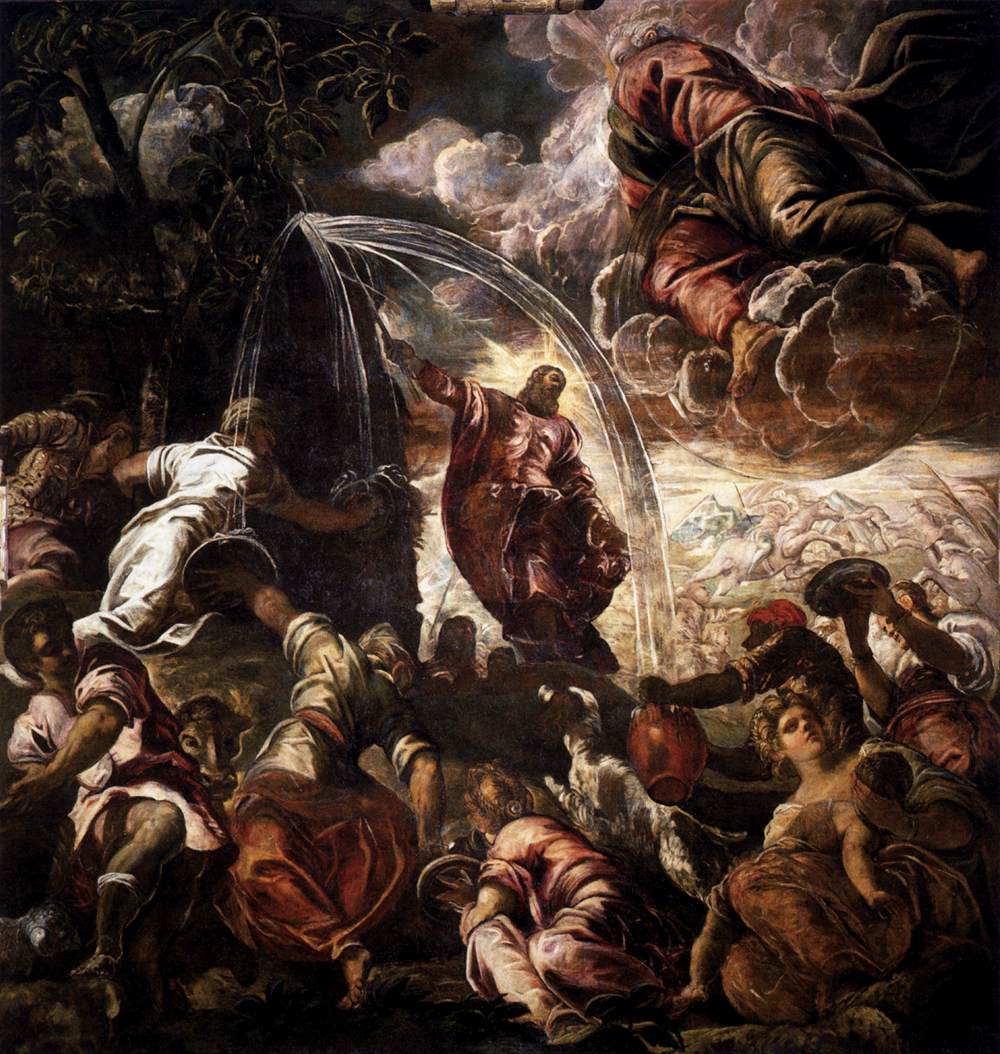 All of this clearly prefigures Christians. We’re under the Holy Spirit prefigured by the cloud; we’re baptized “by water and the Spirit” (John 3:5), prefigured by the Jews walking through the Red Sea, under the cloud; we’ve got the Eucharistic Bread, prefigured by the Manna, the Jews’ spiritual food; and we’ve got the Eucharistic Cup, prefigured by the water flowing from the rock.
All of this clearly prefigures Christians. We’re under the Holy Spirit prefigured by the cloud; we’re baptized “by water and the Spirit” (John 3:5), prefigured by the Jews walking through the Red Sea, under the cloud; we’ve got the Eucharistic Bread, prefigured by the Manna, the Jews’ spiritual food; and we’ve got the Eucharistic Cup, prefigured by the water flowing from the rock.
Paul calls the manna and water spiritual food and drink, but the Jews still actually ate and drank them. Protestants has introduced a dichotomy that “spiritual” means “not physical,” but Scripture doesn’t treat it this way. Rather, “spiritual” often means “more than physical.” The manna not only fed the starving Israelites, it reminded them that they had a God who loved them and cared for them. Likewise, the water from the Rock quenched their thirst and their fears.
St. Ambrose pointed out that for the Manna and water to be typology, the Bread and Wine offered by Christ must be superior, which can be only the Eucharist:
We have proved the sacraments of the Church to be the more ancient, now recognize that they are superior. In very truth it is a marvellous thing that God rained manna on the fathers, and fed them with daily food from heaven; so that it is said, “So man did eat angels’ food.” [Psalm 78:25] But yet all those who ate that food died in the wilderness, but that food which you receive, that living Bread which came down from heaven, furnishes the substance of eternal life; and whosoever shall eat of this Bread shall never die, and it is the Body of Christ.
Now consider whether the bread of angels be more excellent or the Flesh of Christ, which is indeed the body of life. That manna came from heaven, this is above the heavens; that was of heaven, this is of the Lord of the heavens; that was liable to corruption, if kept a second day, this is far from all corruption, for whosoever shall taste it holily shall not be able to feel corruption. For them water flowed from the rock, for you Blood flowed from Christ; water satisfied them for a time, the Blood satiates you for eternity. The Jew drinks and thirsts again, you after drinking will be beyond the power of thirsting; that was in a shadow, this is in truth.
If that which you so wonder at is but shadow, how great must that be whose very shadow you wonder at. See now what happened in the case of the fathers was shadow: “They drank, it is said, of that Rock that followed them, and that Rock was Christ. But with many of them God was not well pleased, for they were overthrown in the wilderness. Now these things were done in a figure concerning us.” [1 Cor. 10:4] You recognize now which are the more excellent, for light is better than shadow, truth than a figure, the Body of its Giver than the manna from heaven.
Paul warns that even Christians Baptized by water and the Holy Spirit, and partaking of Communion, can still be damned. And here, he goes back to the Israelites in Exodus (1 Cor. 5-6):
Nevertheless, with most of them God was not well-pleased; for they were laid low in the wilderness. Now these things happened as examples for us, so that we would not crave evil things as they also craved.
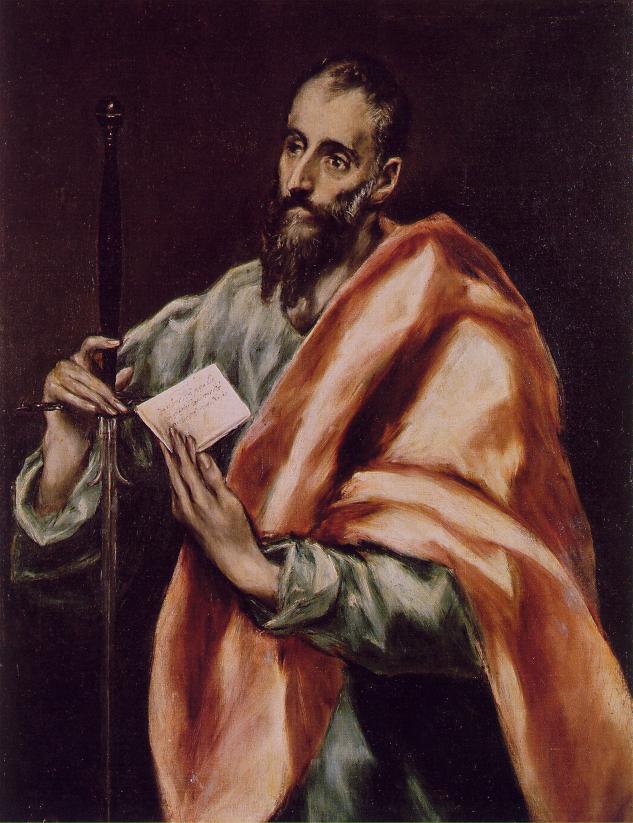 There’s a warning here for Catholics, for sure. We can become lax, thinking that because we have the Eucharist, we need not worry about the state of our souls. Paul notes that this wasn’t true of the Israelites in Exodus. Though they fed on the spiritual food and drink of God, their sins still ensured their condemnation. It’s not different today.
There’s a warning here for Catholics, for sure. We can become lax, thinking that because we have the Eucharist, we need not worry about the state of our souls. Paul notes that this wasn’t true of the Israelites in Exodus. Though they fed on the spiritual food and drink of God, their sins still ensured their condemnation. It’s not different today.Likewise, just because we enjoy these numerous spiritual blessings doesn’t mean we can just call ourselves “Once Saved, Always Saved” and grow lax. We can partake of all of these sacraments and still be damned, and the disobedient Israelites were physically killed as a spiritual sign. Here, Paul gets to the first of the sins that the Corinthians are guilty of: idolatry (1 Cor. 10:7), immorality (1 Cor. 10:8), testing the Lord (1 Cor. 10:9), and complaining (1 Cor. 10:10). He notes that all of these are sins that their forefathers were guilty of, and were punished by God for, despite enjoying His numerous blessings. Again, he says, these are also examples given for our edification, and to remind us that we’re not alone when we struggle against sin (1 Cor. 10:11-13):
Now these things happened to them as an example, and they were written for our instruction, upon whom the ends of the ages have come. Therefore let him who thinks he stands take heed that he does not fall. No temptation has overtaken you but such as is common to man; and God is faithful, who will not allow you to be tempted beyond what you are able, but with the temptation will provide the way of escape also, so that you will be able to endure it.
Paul is attempting to shore up what the Corinthians already have. This makes sense from a Catholic perspective, where we acknowledge that Christians can fall back into the filth of their prior ways, and need to be edified and sanctified to prevent such an outcome. But if you believe that once a person is truly saved, truly standing firm in Christ, they can never fall totally away (and we are talking about a total falling away, as Paul compares it to the death of the sinful Israelites, not simply a punishment), this advice is meaningless or worse.
One of the major problems the Corinthians suffer from is that they are cavorting with idolators, and sharing in food sacrificed to idols. Paul notes in 1 Corinthians 10:23-33 that eating the food itself isn’t the problem. That is, Christians don’t have any sort of kosher laws, so the fact that food may have been offered to demons without your knowledge doesn’t matter. What matters is that the Corinthians know the food is being offered to demons, and that by knowingly sharing in it, the Corinthians appear to be partaking in the idolatry themselves, causing scandal to both believers and pagans alike (see 1 Cor. 10:27-28). Paul explains that they can’t commune with demons and commune with Christ in the Eucharist:
Therefore, my beloved, flee from idolatry. I speak as to wise men; you judge what I say.Is not the cup of blessing which we bless a sharing in the blood of Christ? Is not the bread which we break a sharing in the body of Christ? Since there is one bread, we who are many are one body; for we all partake of the one bread. Look at the nation Israel; are not those who eat the sacrifices sharers in the altar? What do I mean then? That a thing sacrificed to idols is anything, or that an idol is anything? No, but I say that the things which the Gentiles sacrifice, they sacrifice to demons and not to God; and I do not want you to become sharers in demons. You cannot drink the cup of the Lord and the cup of demons; you cannot partake of the table of the Lord and the table of demons.
This shows that Paul considers the Eucharist to be a Sacrifice. After all, the way Paul proves the Eucharist is a sharing in the Body and Blood of Christ is by showing that when the Jews and pagans eat the things they sacrifice they share in that sacrifice. The whole passage becomes nonsensical if you deny that the Eucharist is a Sacrifice, because Paul’s proofs stop working. Then he closes by showing that you have to choose: are you going to partake of the Christian sacrificial meal, or the pagan sacrificial meal? God will require a choice (1 Cor. 10:22): “Or do we provoke the Lord to jealousy? We are not stronger than He, are we?“
A friend of mine tried to argue that this passage refuted the Eucharist, since Paul uses the terms “Cup” and “Bread” to refer to the Eucharist post-consecration. What else could he have possibly said? He’s explaining that what we would now call the species of bread is truly the Body of Christ, and the species of wine is truly the Blood of Christ, without the assistance of technical language. To refer to the Eucharistic Bread as the Body of Christ would render the passage tautological (‘the Body of Christ is the Body of Christ’). But besides this, anyone who claims that “bread” means “not the Body of Jesus” should look at what Jesus Himself has to say about this. He calls Himself the Bread of Life (John 6:35, John 6:48), the Bread that Came Down from Heaven (John 6:41), and the Living Bread that Came Down from Heaven (John 6:51). He then immediately clarifies that “the bread also which I will give for the life of the world is My Flesh” (John 6:51).
Finally, we see from Paul that the Eucharist is the bedrock of Christianity: “Since there is one bread, we who are many are one body; for we all partake of the one bread” (1 Cor. 10:17). Because of the Eucharist, we are one. Nearly every Protestant denomination gets this backwards, thinking that the Lord’s Supper celebrates our oneness. It doesn’t. It creates our oneness. Without the Eucharist, we’re not united.
Paul distinguishes the Eucharist from physical eating and drinking (1 Cor. 11:20-22):
Therefore when you meet together, it is not to eat the Lord’s Supper, for in your eating each one takes his own supper first; and one is hungry and another is drunk. What! Do you not have houses in which to eat and drink? Or do you despise the church of God and shame those who have nothing? What shall I say to you? Shall I praise you? In this I will not praise you.
So the early Christians have brought their own food and drink to the Lord’s Supper, turning it into a picnic of some sort, reminding the poor of their poverty in the process. Paul is furious with them for this, and tells them to eat at home. Now, if the Eucharist is simply food and drink, Paul’s instructions make no sense. In fact, if food and drink were appropriate at the Lord’s Supper, Paul’s instruction should have been for them to share. But he doesn’t say that. He says to eat on your own time. So the Eucharist, while physical, is primarily spiritual food and drink. We’re not eating it to get full or to get drunk. The parallel he drew in the last chapter to Manna and the Water from the Rock is complete.
Then Paul immediately gives the words of institution (1 Cor. 11:23-25)
For I received from the Lord that which I also delivered to you, that the Lord Jesus in the night in which He was betrayed took bread; and when He had given thanks, He broke it and said, “This is My body, which is for you; do this in remembrance of Me.” In the same way He took the cup also after supper, saying, “This cup is the new covenant in My blood; do this, as often as you drink it, in remembrance of Me.”
This is one of the most significant passages in Scripture. Let’s start from the first word, “For.” The transition shows that Paul views what he’s about to say (that the Eucharist was given to us by Christ as His Body and Blood) is an explanation for what he’s just said (that you shouldn’t be bringing food to Mass).Paul explains that the Eucharist is offered as Jesus’ Body and Blood. And not only that, but for this reason, it’s inappropriate to have other food or drink at the Eucharist.
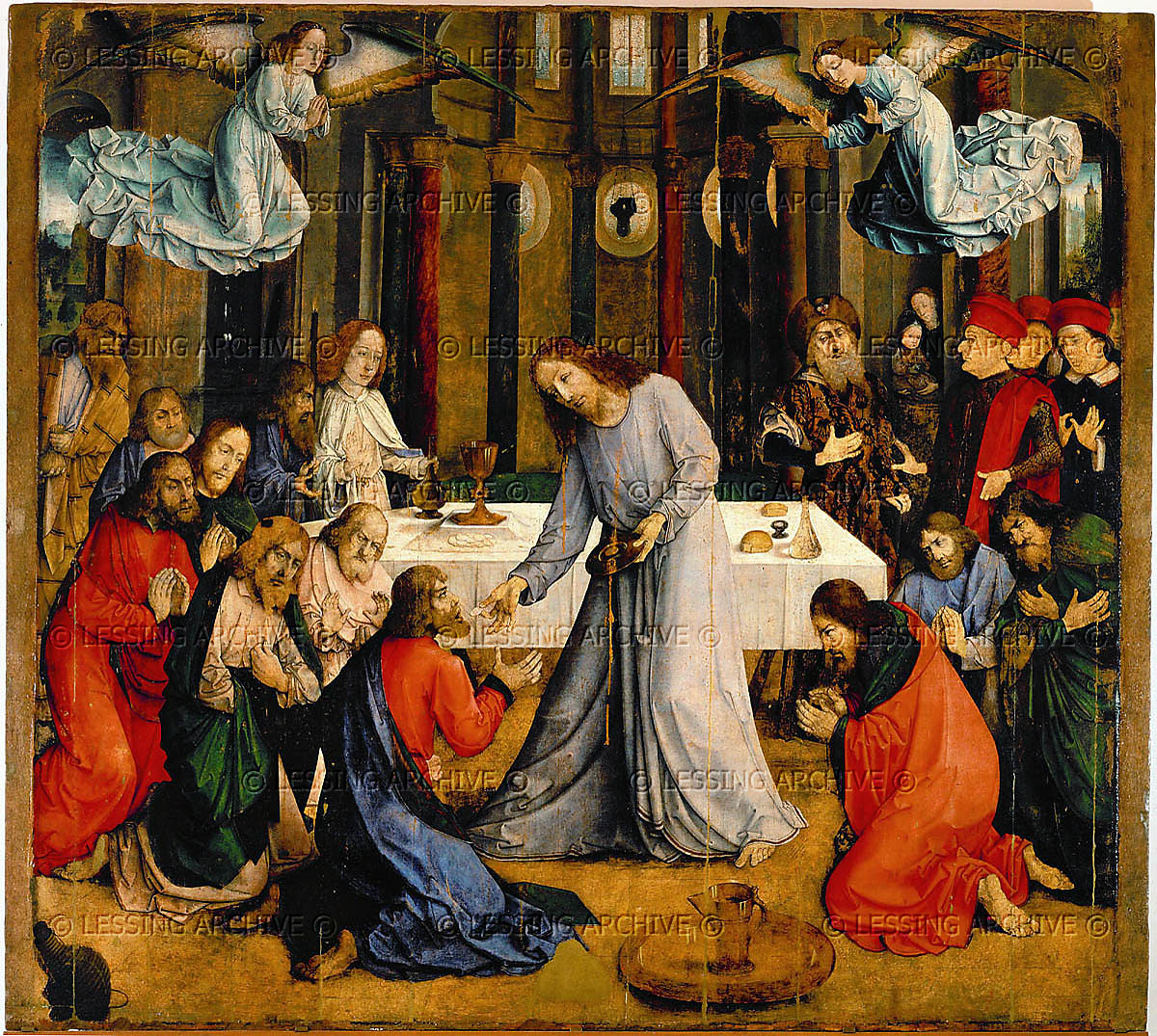 Then Paul says that he received “from the Lord” what he delivers on. The rabbis would say to let the listener know they were about to hear, not the rabbi’s own wisdom, but tradition from someone greater. Paul’s explaining that what comes next isn’t on his own authority, even as an Apostle. It comes straight from Jesus Christ Himself. What’s more remarkable: Paul wasn’t at the Last Supper. So this is so important that Paul knows what happened there, word-for-word, even though he wasn’t there, and the Gospels hadn’t yet been written.
Then Paul says that he received “from the Lord” what he delivers on. The rabbis would say to let the listener know they were about to hear, not the rabbi’s own wisdom, but tradition from someone greater. Paul’s explaining that what comes next isn’t on his own authority, even as an Apostle. It comes straight from Jesus Christ Himself. What’s more remarkable: Paul wasn’t at the Last Supper. So this is so important that Paul knows what happened there, word-for-word, even though he wasn’t there, and the Gospels hadn’t yet been written.
Skipping ahead, Jesus says “This IS My Body” and “This IS the New Covenant in My Blood.” Remember before that I quoted Hebrews 8:5-6 as showing that the New Covenant is infinitely superior, and founded on better promises, than the Old Covenant. The Eucharist is the only time Jesus describes Himself as establishing the New Covenant. And the New Covenant isn’t represented by the Blood. It’s in His Blood.
Hebrews 9:18-23,
Therefore even the first covenant was not inaugurated without blood. For when every commandment had been spoken by Moses to all the people according to the Law, he took the blood of the calves and the goats, with water and scarlet wool and hyssop, and sprinkled both the book itself and all the people, saying, “THIS IS THE BLOOD OF THE COVENANT WHICH GOD COMMANDED YOU.”
And in the same way he sprinkled both the tabernacle and all the vessels of the ministry with the blood. And according to the Law, one may almost say, all things are cleansed with blood, and without shedding of blood there is no forgiveness. Therefore it was necessary for the copies of the things in the heavens to be cleansed with these, but the heavenly things themselves with better sacrifices than these.
Three things are said: (1) without Blood, there’s no forgiveness of sins; (2) this was true even of the Old Covenant; and (3) the Old Covenant is inferior to the New. The blood forgiveness in the Old Covenant permitted you to go into the Temple, the prefigurement of Heaven. The Blood shed in the New Covenant permits you to go to Heaven.
It’s clearly Christ’s Blood, and Protestants acknowledge that. But if that’s true, the Eucharist is truly the Blood of Christ. It inescapable. The quotation in Hebrews 9:20 is a blending of Moses’ words instituting the Old Covenant in Exodus 24:8, with Christ’s words instituting the New Covenant at the Last Supper. The parallel is inescapable, and Hebrews ties them together. But in tying them together, we’re forced to acknowledge Jesus was really offering us His Blood in the Eucharist when He said He was. Otherwise, Moses used real blood in the implementing the Old Covenant, while Christ used only a shadow and a symbol of His Blood in the New. And since Hebrews 8:5-6 and Hebrews 9:23 make it really clear that the Old Covenant is the shadow prefiguring the superior New Covenant, that second choice is contrary to Scripture.
Finally, Paul notes that Jesus says, “do this, as often as you drink it, in remembrance of Me” (1 Cor. 11:25). Paul then adds (1 Cor. 11:26),
For as often as you eat this bread and drink the cup, you proclaim the Lord’s death until He comes.
Stripped of all of the surrounding context, these two verses seem to suggest that the Eucharist is simply a reminder of how Jesus died for our sins. But an audience familiar with Temple Judaism would immediately know that wasn’t the case.
Generally, a “remembrance” within Judaism was sacrificial. So we hear in Leviticus 24:7, “You shall put pure frankincense on each row that it may be a memorial portion for the bread, even an offering by fire to the LORD.” In the Greek translation of the Old Testament, the word for the “memorial portion” is the same as the word for the “remembrance” Jesus is calling for. Same with passages like Leviticus 2:2. So Jesus’ use of the term “remembrance” calls to mind the grain offerings to God, which is perfectly fitting, since those prefigure offering the Bread of Life, the Body of Christ in the Eucharist, to the Father. Likewise, Numbers 10:10 describes the “burnt offerings and fellowship offerings” as a “Memorial” (again: the same word as “remembrance” in the Greek). Once again, this is fitting, since the fellowship offerings prefigure the Communion brought about by the Eucharist (see 1 Cor. 10:17).
So Jesus is actually commanding His Apostles to offer a memorial Sacrifice. That’s why Catholics view this verse as the precise moment in which Jesus institutes the priesthood. It’s here most explicitly that Jesus says to a select group of men He’s appointed that they should offer the Eucharist up as Sacrifice. Notice that no matter how you slice it, this is absolutely liturgical. Jesus doesn’t just say to pray however you feel moved to pray, or celebrate however you feel. He sets down a memorial and commands it to be celebrated as He instructed, saying “Do this.” He then turns over a lot of discretion to the Apostles (and by extension, the Church they help establish), saying, “as often as you drink It,” So we’re ordered to keep the Eucharistic Feast, but when and how often are questions He leaves up to the Church.
Now that Paul has established that the Eucharist really is the Body and Blood of Christ, according to Jesus Christ Himself, that it establishes the New Covenant, that it is the bedrock of Christianity, and that it is truly a Memorial Sacrifice offered to God, and a sharing in Christ, he turns to the implications. First (1 Cor. 11:27),
Therefore whoever eats the bread or drinks the cup of the Lord in an unworthy manner, shall be guilty of the body and the blood of the Lord.
Anyone who has set aside the Law of Moses dies without mercy on the testimony of two or three witnesses. How much severer punishment do you think he will deserve who has trampled under foot the Son of God, and has regarded as unclean the blood of the covenant by which he was sanctified, and has insulted the Spirit of grace?
So to regard as unclean the “Blood of the Covenant,” which Hebrews 9:20 and 1 Cor. 11:25 already tied to the Eucharistic institution, is to trample under foot the Son of God, earning yourself severe and merciless death. If the Eucharist was simply symbolic, this would be the exact sort of legalism that Christ liberated us from. The notion that we have to treat mere symbols with such respect that our salvation depends on it is something Christians rightly reject, none moreso than Paul. But Paul does not put the Eucharist in that symbolic category. If the Eucharist truly is Christ, Paul’s conclusion is obviously correct.
Paul continues, in 1 Cor. 11:28-32, along the same theme:
But a man must examine himself, and in so doing he is to eat of the bread and drink of the cup. For he who eats and drinks, eats and drinks judgment to himself if he does not judge the body rightly. For this reason many among you are weak and sick, and a number sleep. But if we judged ourselves rightly, we would not be judged. But when we are judged, we are disciplined by the Lord so that we will not be condemned along with the world.
Finally, Paul concludes with two pieces of sound instruction (1 Cor. 11:33-34):
So then, my brethren, when you come together to eat, wait for one another. If anyone is hungry, let him eat at home, so that you will not come together for judgment. The remaining matters I will arrange when I come.

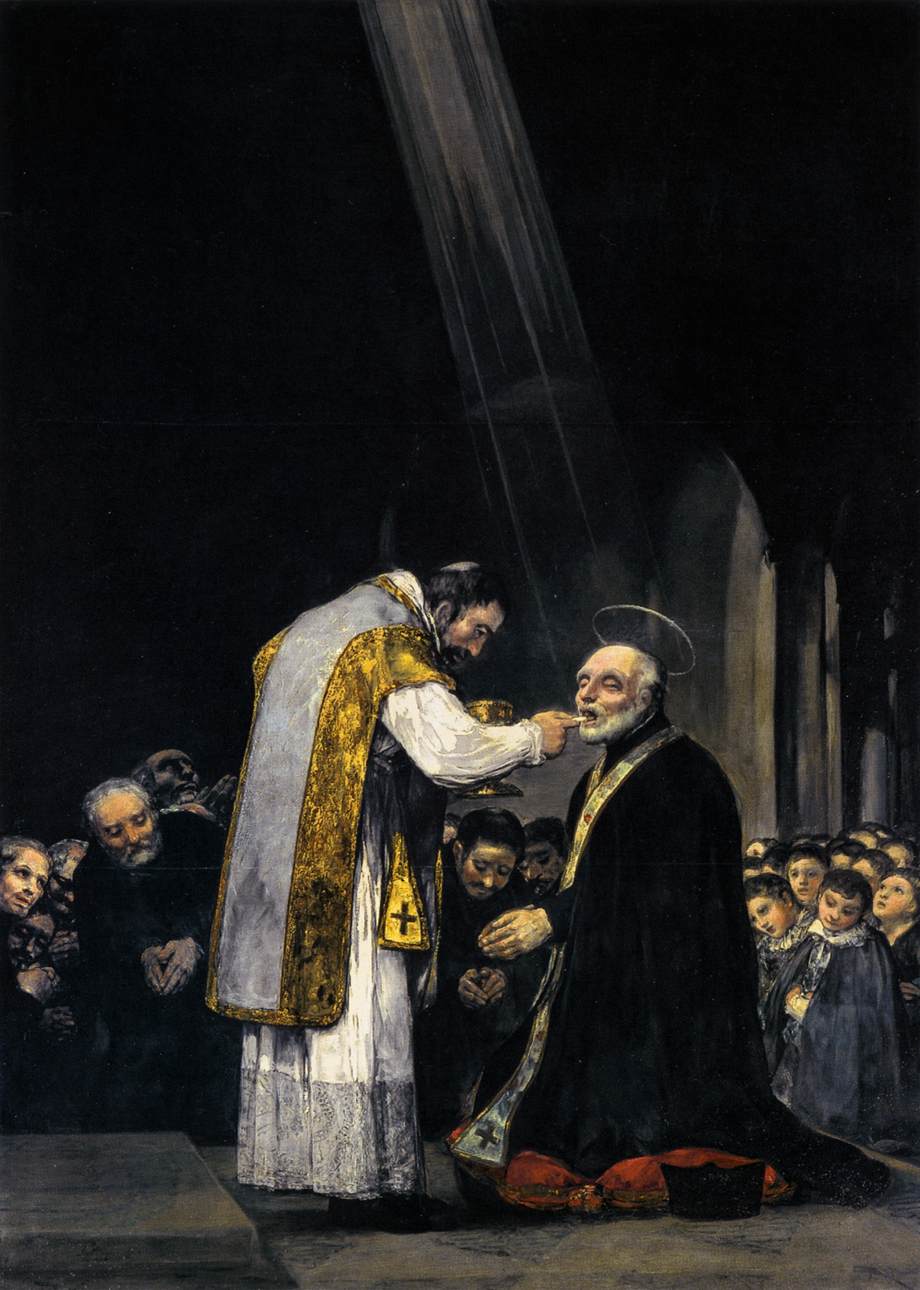
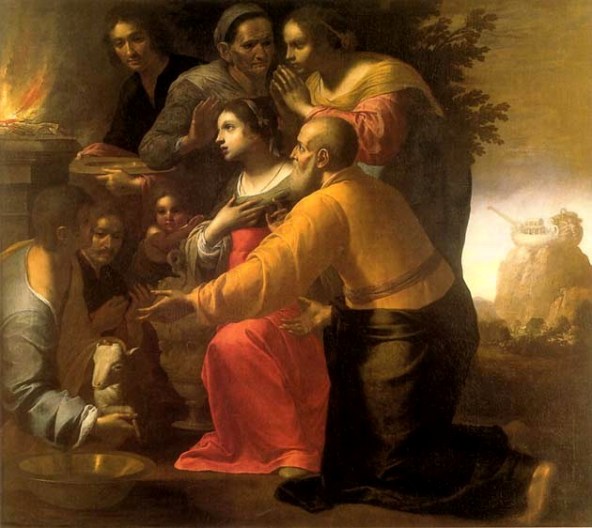
Good God Bless you.Amen
This has helped me so much. God bless you.
Excellent!
This is truely powerful!!! I can’t remember how I stumbled here. More Catholics need to read this piece. God bless you!!
Bible believing Christian’s are taught to read the whole of God’s word, and use the Bible itself to interpret scripture. Jesus explains what He means in later verses when He is speaking metaphorically. This article is a hodge lodge of scripture and Catholic misinterpretation. Read it for yourself, in context, and you’ll see how often Catholics misinterpret in order to support their own faulty understanding.
“Hodgepodge”